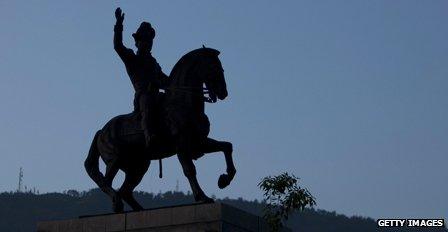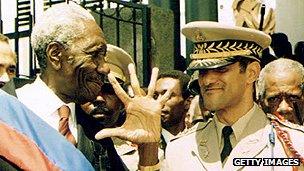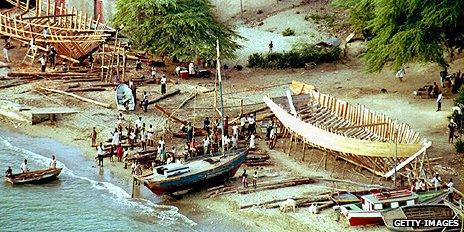Haiti profile - Timeline
- Published
A chronology of key events:
1492 - Christopher Columbus lands and names the island Hispaniola, or Little Spain.

Former slave Jean-Jacques Dessalines was independent Haiti's first ruler
1496 - Spain establishes first European settlement in western hemisphere at Santo Domingo, now capital of Dominican Republic.
1697 - Spain cedes western part of Hispaniola to France, and this becomes Haiti.
1801 - A former black slave who became a guerrilla leader, Toussaint Louverture, conquers Haiti, abolishing slavery and proclaiming himself governor-general of an autonomous government over all Hispaniola.
1802 - French force led by Napoleon's brother-in-law, Charles Leclerc, fails to conquer Haitian interior.
Independence
1804 - Haiti becomes independent; former slave Jean-Jacques Dessalines declares himself emperor.
1806 - Dessalines assassinated and Haiti divided into a black-controlled north and a mulatto-ruled south
1818-43 - Pierre Boyer unifies Haiti, but excludes blacks from power.
1915 - US invades Haiti following black-mulatto friction, which it thought endangered its property and investments in the country.
1934 - US withdraws troops from Haiti, but maintains fiscal control until 1947.
Duvalier dictatorships
1956 - Voodoo physician Francois "Papa Doc" Duvalier seizes power in military coup and is elected president a year later.
1964 - Duvalier declares himself president-for-life and establishes a dictatorship with the help of the Tontons Macoutes militia.
1971 - Duvalier dies and is succeeded by his 19-year-old son, Jean-Claude, or "Baby Doc", who also declares himself president-for-life.
1986 - Baby Doc flees Haiti in the wake of mounting popular discontent and is replaced by Lieutenant-General Henri Namphy as head of a governing council.
1988 - Leslie Manigat becomes president, but is ousted in a coup led by Brigadier-General Prosper Avril, who installs a civilian government under military control.
Democracy, coup and intervention
1990 - Jean-Bertrand Aristide elected president in Haiti's first free and peaceful polls.
1991 - Aristide ousted in a coup led by Brigadier-General Raoul Cedras, triggering sanctions by the US and the Organisation of American States.
1994 - Military regime relinquishes power in the face of an imminent US invasion; US forces oversee a transition to a civilian government; Aristide returns.

Raoul Cedras (r) seized power but handed over to interim President Emile Jonassaint (l)
1995 - UN peacekeepers begin to replace US troops; Aristide supporters win parliamentary elections
Rene Preval, from Aristide's Lavalas party, is elected in December to replace Aristide as president.
1997-99 - Serious political deadlock; new government named.
1999 - Preval declares that parliament's term has expired and begins ruling by decree following a series of disagreements with deputies.
Aristide's second term
2000 November - Aristide elected president for a second non-consecutive term, amid allegations of irregularities.
2001 July - Presidential spokesman accuses former army officers of trying to overthrow the government after armed men attack three locations, killing four police officers.
2001 December - 30 armed men try to seize the National Palace in an apparent coup attempt; 12 people are killed in the raid, which the government blames on former army members.
2002 July - Haiti is approved as a full member of the Caribbean Community (Caricom) trade bloc.
2003 April - Voodoo recognised as a religion, on a par with other faiths.
2004 January-February - Celebrations marking 200 years of independence turn into uprising against President Aristide, who is forced into exile. An interim government takes over.
2004 May - Severe floods in south, and in parts of neighbouring Dominican Republic, leave more than 2,000 dead or disappeared.
2004 June - First UN peacekeepers arrive, to take over security duties from US-led force and to help flood survivors.
2004 July - International donors pledge more than $1bn in aid.
2004 September - Nearly 3,000 killed in flooding in the north, in the wake of tropical storm Jeanne.
Late 2004 - Rising levels of deadly political and gang violence in the capital; armed gangs loyal to former President Aristide are said to be responsible for many killings.

Hundreds of thousands of Haitians have fled abroad, often risking their lives in boats like these seen being built in the early 1990s
2005 April - Prominent rebel leader Ravix Remissainthe is killed by police in the capital.
2005 July - Hurricane Dennis kills at least 45 people.
2006 February - General elections, the first since former President Aristide was overthrown in 2004. Rene Preval is declared the winner of the presidential vote after a deal is reached over spoiled ballot papers.
2006 June - A democratically-elected government headed by Prime Minister Jacques-Edouard Alexis takes office.
2006 September - Launch of a UN-run scheme to disarm gang members in return for grants, job training.
2006 October - US partially lifts an arms embargo, imposed in 1991.
2007 January - UN troops launch tough new offensive against armed gangs in Cite Soleil, one of the capital's largest and most violent shantytowns.
2008 April - Food riots. Government announces emergency plan to cut price of rice in bid to halt unrest. Parliament dismisses Prime Minister Alexis.
2008 May - US and World Bank announce extra food aid totalling 30m dollars.
In response to plea from President Preval for more police to help combat wave of kidnappings-for-ransom, Brazil agrees to boost its peacekeeping force.
Tropical storms
2008 August/September - Nearly 800 people are killed and hundreds are left injured as Haiti is hit by a series of devastating storms and hurricanes.
2008 September - Michele Pierre-Louis succeeds Jacques-Edouard Alexis as prime minister.
2009 May - Former US President Bill Clinton appointed UN special envoy to Haiti.
2009 July - World Bank and International Monetary Fund cancel $1.2bn of Haiti's debt - 80% of the total - after judging it to have fulfilled economic reform and poverty reduction conditions.
2009 October-November - Jean-Max Bellerive becomes prime minister after the Senate passes censure motion against his predecessor, Michelle Pierre-Louis.
2010 January - Up to 300,000 people are killed when a magnitude 7.0 earthquake hits the capital Port-au-Prince and its wider region - the worst in Haiti in 200 years.
US takes control of the main airport to ensure orderly arrival of aid flights.
2010 March - International donors pledge $5.3 billion for post-quake reconstruction at a donor conference at UN headquarters.
2010 July - Popular anger grows over slow pace of reconstruction six months after quake.
2010 October - Run-up to presidential, parliamentary polls due on 28 November. Concern over exclusion of popular candidates.
Protests
2010 October-December - Cholera outbreak claims some 3,500 lives and triggers violent protests. The source of the outbreak is thought to be a camp for recently-arrived UN soldiers.
2010 November - Presidential and parliamentary elections.
2010 December - Announcement of inconclusive provisional results of presidential election triggers violent protests.
2011 January - Former president Jean-Claude Duvalier returns from exile, faces corruption and human rights abuse charges.
Martelly presidency
2011 March - Michel Martelly wins second round of presidential election.
2011 July - Death toll from cholera outbreak climbs to nearly 6,000.
2011 October - President Martelly appoints UN development expert Garry Conille as his prime minister, after parliament rejected his two previous nominees.
2012 January - Presidential Martelly proposes reviving Haiti's army, which was disbanded in 1995 because of its role in coups and its history of human rights abuses.
2012 February - Prime Minister Garry Conille resigns in protest at the refusal of many of his ministers and the presidential administration to cooperate with a parliamentary inquiry into dual citizenship among senior officials.
2012 May - Parliament approves Foreign Minister Laurent Lamothe as prime minister.
2012 October - Hundreds protest against the high cost of living and call for the resignation of President Martelly. They accuse the president of corruption and failure to deliver on his promises to alleviate poverty.
2012 November - Hurricane Sandy causes extensive crop damage and leaves at least 20,000 people homeless, exacerbating the cholera epidemic.
2013 May - Thousands of people turn out for ex-president Aristide's first public appearance since his return from exile two years previously. He gives evidence in a court case.
2013 October - Lawyers representing victims of a cholera epidemic in Haiti file a lawsuit against the United Nations at a court in New York. They say UN peacekeepers introduced cholera to Haiti in 2010.
2013 November/December - Street protests in Port-au-Prince and other major cities, with marchers voicing discontent about various issues including an overdue election, unemployment and corruption.
2014 April - New wave of anti-government protests begins in Port-au-Prince.
2014 December - Prime Minister Laurent Lamothe resigns over failure to reach agreement with opposition over delayed elections, amid escalating street protests.
2015 January - President Martelly appoints former mayor of Port-au-Prince Evans Paul head of a planned national unity government as protests continue and parliament's mandate expires.
2015 August - First round of long-delayed parliamentary elections held. Second round to coincide with presidential poll in October.
2016 February - Michel Martelly ends his presidential term without handing power to a successor after the run-off presidential election is postponed indefinitely. Parliament appoints Jocelerme Privert as interim president.
2016 October - Hurricane Matthew, the strongest to hit the region in a decade, kills hundreds in Haiti and destroys thousands of homes.
2017 January - Provisional Electoral Council declares Jovenel Moise the winner of the November 2016 presidential elections ending a political crisis which began in October 2015 over allegations of electoral fraud.
2017 June - Guy Philippe, leader of the 2004 coup that toppled President Aristide, is jailed in the US for money laundering. He was arrested days before being sworn in as senator.
2018 February - International aid agencies face scrutiny after revelations of sexual misconduct by Oxfam staff in Haiti in 2011.
2019 February - At least four people are killed and dozens injured in nationwide anti-corruption protests against President Moise and other officials.